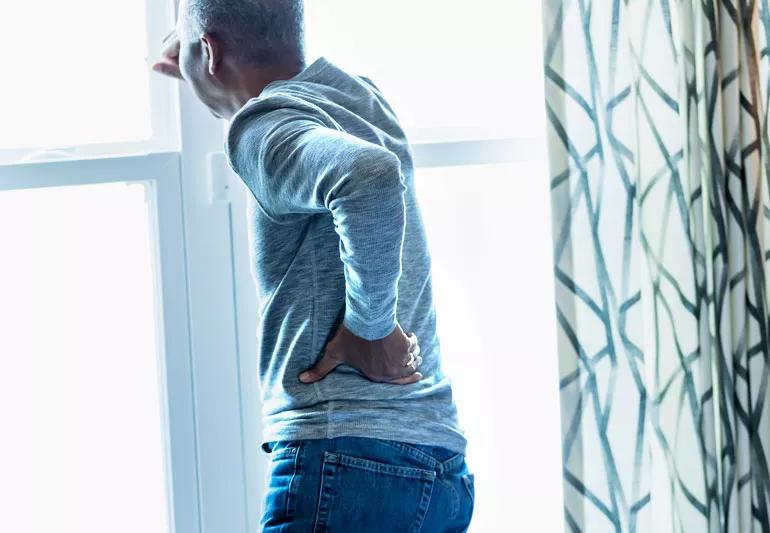Although painful, herniated disks are extremely common

Anybody who has ever experienced a herniated disk before knows how painful it can be. Movement can make it worse and the frustration of waiting for it to heal is enough to make you go crazy.
Advertisement
Cleveland Clinic is a non-profit academic medical center. Advertising on our site helps support our mission. We do not endorse non-Cleveland Clinic products or services. Policy
One minute you’re completely fine, bending down to pick something up. The next minute a shooting, irritating pain is plaguing your neck or back.
You think it might be a herniated disk, but what exactly does that mean? Spine surgeon Dominic Pelle, MD, explains what’s happening to your spine.
One of the simplest ways to understand a herniated disk is to think about a jelly donut. (Yes we know it’s weird, but bear with us.)
You have 24 disks in your spine – ranging from the very top (called the cervical spine) down to the lower spin (called the lumbar spine).
The disks all the way up and down your spine act as shock absorbers to your movement. The disks help hold your spine up and allows it to bend and move.
“If you have a herniated disk, think about it as a jelly donut,” explains Dr. Pelle. “The outside of the disk is like the dough of the donut and is called the annulus fibrosis. The inside of the disk is the jelly in the donut, which is called the nucleus pulposus.”
Now imagine that the donut has a hole somewhere in it and you press down. The jelly is going to squirt out of it – just like the nucleus pulposus would from your actual disk in your spine.
When the nucleus pulposus pushes outside of the annulus fibrosis and touches a nerve, that’s when you experience the pain from a herniated disk.
Advertisement
Movement, injury, pressure, age or just plain bad luck can cause the nucleus pulposus to push through the annulus fibrosis – just like the inside of a jelly donut would if you pressed down on it.
“Some people get in an accident and have a herniated disk afterwards, other times it’s something as simple as bending down to tie a shoe when it happened,” says Dr. Pelle. “Most often people will know exactly when it happened or what caused it because the pain usually happens right away.”
A herniated disk could also be caused by disk degeneration, genetics or a combination. Certain activities like lifting weights or playing a sport might also cause a herniation.
People experience symptoms of a disk herniation when it presses on a nerve or the spinal cord. A pinched nerve is called radiculopathy and typically causes shooting pain, numbness or weakness. Depending on what nerve is pinched, it can cause pain in a variety of places.
If you have a herniated disk in your lumbar spine, the pain might come down your leg, down your butt, over the hip and down the leg, says Dr. Pelle.
If your herniated disk is pinching a nerve in your cervical spine, it might cause arm pain or weakness that shoots down your shoulder or upper back.
It all depends on the level of the herniated disk and what nerve is getting pinched.
“Pressure on your spinal cord is a bit more serious when you start to have symptoms from it,” explains Dr. Pelle. “That’s usually called myelopathy and has to do with loss of sensation or control in certain areas of the body.”
The average amount of time it takes for a herniated disk to heal is four to six weeks, but it can get better within a few days depending on how severe the herniation was and where it occurred.
The biggest factor in healing a herniated disk is time, because most often it will resolve on its own.
Healing time also depends on what recovery looks like for you and what type of treatment you try.
Dr. Pelle says there are some treatment options that can be started right:
Surgery is an option for some people who fit the criteria for it.
“I always tell people that there are three prerequisites for surgery,” says Dr. Pelle. “You have to have had the pain for at least six weeks. You have to fit the requirements from the physical examination and medical history. And we need to have a serious conversation about how bad the pain is bothering you and affecting your quality of life.”
Advertisement
Surgery on the spine is serious and should be weighed accordingly.
If you think you’re dealing with a severe herniated disk or the pain just won’t go away, schedule an appointment with your doctor.
Advertisement
Learn more about our editorial process.
Advertisement

The short answer from a spine specialist

Most recommended precautions center around minimizing bruising or swelling

Even one drink can have an impact on your cognitive function leading to slurred speech, blurred vision and impaired memory

Understand who may (and may not) benefit

Lorem ipsum dolor sit amet. Et odio Quis vel ipsam omnis eum alias deleniti et placeat impedit non voluptas galisum hic autem enim et cupiditate aliquid. Est beatae quidem non facilis autem ut commodi nisi aut tempore rerum et dolores voluptatem cum enim optio id sapiente quasi. Ad laboriosam officiis 33 cupiditate sequi ea voluptatum consectetur qui necessitatibus voluptate et quasi doloremque et facere explicabo quo explicabo officia

Seeking help through therapy can be an important step in improving your quality of life when you have UC

Type 2 diabetes isn’t inevitable with these dietary changes

Applying a hot or cold compress can help with pain